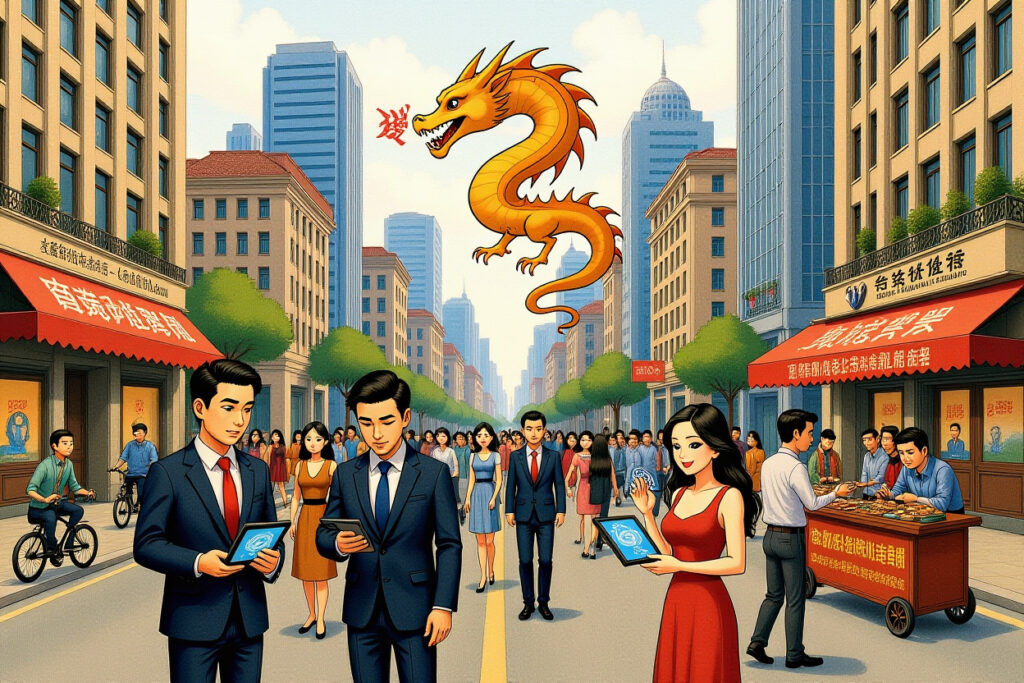– Gree Electric addresses speculation about abandoning the ‘Dong Mingzhu Healthy Home’ brand after WeChat account changes
– Official confirmation reveals technical preparation for new e-commerce platform rather than rebranding
– Marketing chief Zhu Lei (朱磊) details success of Dong Mingzhu’s (董明珠) personal IP in market penetration
– Expansion plans target 10,000 physical ‘Healthy Home’ stores nationwide
– Analysis of celebrity CEO branding strategies in China’s competitive appliance market
When Gree Electric’s official WeChat accounts suddenly changed names from ‘Dong Mingzhu Healthy Home’ (董明珠健康家) to ‘Gree Good Products Guide’ (格力好物指南) this week, industry observers buzzed with speculation about a major rebrand. The unexpected shift appeared to signal retreat from the personal branding strategy centered around Gree’s iconic chairwoman Dong Mingzhu (董明珠). Within hours, rumors swirled across Chinese social media that Gree might be distancing itself from the controversial naming approach. However, company insiders quickly stepped forward with a surprising explanation that reveals deeper strategic ambitions. This development offers a fascinating case study in corporate branding evolution, leadership influence, and the calculated risks of tying corporate identity to a celebrity CEO. As Gree prepares for a massive nationwide retail expansion, understanding the mechanics behind Dong Mingzhu’s personal IP becomes essential for decoding China’s competitive home appliance landscape.
The WeChat Account Shuffle: Technical Move, Not Strategic Retreat
Gree Electric insiders swiftly clarified that the account name change resulted from technical constraints rather than branding strategy shifts. According to internal sources, the modification was necessary to comply with Tencent’s platform regulations while preparing for the launch of a new ‘Dong Mingzhu Healthy Home’ online marketplace. A company representative explained: “We’re transitioning the ‘Gree Dong Mingzhu Store’ mini-program to become ‘Dong Mingzhu Healthy Home’ – but WeChat’s rules prevent two accounts from sharing identical names. The public account temporarily vacated the name to enable the e-commerce platform’s launch.” This procedural maneuver highlights the complex logistics behind brand architecture in China’s digital ecosystem.
Platform Limitations Driving Brand Decisions
– WeChat’s naming policies create operational challenges for corporations synchronizing multiple accounts
– Temporary rebranding solutions often trigger unintended market speculation
– Technical constraints increasingly influence brand presentation in China’s app-dominated commerce landscape
The incident underscores how platform governance shapes corporate branding decisions. For comprehensive understanding of WeChat’s evolving business policies, Tencent’s official developer documentation provides detailed insights into these technical constraints.
The Power of Personal IP: Gree’s Marketing Calculus
Gree’s marketing leadership stands firmly behind the ‘Dong Mingzhu Healthy Home’ branding strategy. Zhu Lei (朱磊), the company’s Marketing Director, recently emphasized the campaign’s remarkable success: “The market reception has exceeded expectations. While some consumers initially questioned the approach, adoption rates prove overwhelming.” Zhu credits Dong Mingzhu’s personal stature for accelerating market penetration and reducing customer education costs. This calculated embrace of Dong Mingzhu’s personal IP represents a bold departure from traditional corporate branding approaches.
Measuring the Celebrity CEO Advantage
– Instant brand recognition through Dong Mingzhu’s (董明珠) national prominence
– Estimated 60% reduction in customer acquisition costs compared to traditional campaigns
– Emotional connection with consumers transcending product specifications
– Media amplification through Dong’s frequent appearances on business programs
Zhu Lei elaborated on the strategic thinking: “Leveraging Chairwoman Dong’s personal IP isn’t just about grabbing attention – it validates our branding direction and demonstrates how leadership identity actively drives corporate growth.” Industry analysts note this approach particularly resonates with China’s 35-55 demographic, who associate Dong Mingzhu with quality and resilience.
National Expansion: 10,000 Stores Strategy
Contrary to speculation about retreat, Gree is doubling down on the ‘Dong Mingzhu Healthy Home’ concept with ambitious physical expansion plans. Company announcements confirm intentions to establish 10,000 branded stores nationwide, transforming the initiative from marketing campaign to comprehensive retail ecosystem. This infrastructure investment signals Gree’s commitment to dominating the premium home appliance segment.
Store Format and Consumer Experience
– Integrated showrooms featuring Gree’s full product ecosystem
– Health-focused product demonstrations with air purification and water filtration systems
– Personalized smart home consultations leveraging Gree’s IoT technology
– Localized service hubs reducing appliance maintenance response times
The rollout follows successful pilot locations in Guangdong and Zhejiang provinces, where stores reportedly achieved 200% higher foot traffic than traditional outlets. Each location prominently features Dong Mingzhu’s branding and values messaging, creating what retail designers call “personalized corporate spaces.”
Leadership Legacy: Dong Mingzhu’s Transformative Impact
Understanding the branding strategy requires examining Dong Mingzhu’s extraordinary tenure. Appointed president in 2001 during the company’s financial struggles, she famously declared: “Without me, Gree would collapse.” Her leadership transformed the then-ailing manufacturer into a global appliance powerhouse with current market valuation exceeding $35 billion. This turnaround narrative remains central to Gree’s brand identity and consumer trust.
The Personal-Brand Corporate Paradox
– Balancing corporate stability with leadership-centric branding
– Succession planning challenges for personality-driven companies
– Maintaining brand consistency during leadership transitions
– Global precedents from similar models like Virgin’s Richard Branson
Dong Mingzhu’s recent comments to Phoenix Finance reveal undiminished conviction: “Taking charge during Gree’s difficult period remains my proudest achievement – we created value for society.” This deep identification between leader and corporation makes the ‘Healthy Home’ branding strategy a natural extension rather than marketing gimmick.
Brand Architecture in the Chinese Market
Gree’s approach reflects broader trends in China’s corporate branding landscape. Consumer research indicates 68% of Chinese buyers prefer brands with visible leadership, compared to just 32% in Western markets. This cultural distinction creates unique opportunities for executive-led branding when executed strategically.
Alternative Corporate Branding Models
– Huawei’s technology-focused branding without prominent executive figures
– Xiaomi’s community-driven approach centered on user engagement
– Midea’s diversified product branding without CEO personalization
– Haier’s ecosystem model emphasizing interconnected smart appliances
Each approach carries distinct advantages, but Gree’s results suggest the personal IP model delivers exceptional cut-through in crowded markets. Retail analytics indicate ‘Dong Mingzhu Healthy Home’ branded products command 15-20% premium pricing with equivalent specifications to competitors.
Navigating Brand Evolution Challenges
Despite current success, Gree faces complex branding challenges ahead. Industry observers note three critical considerations for sustaining the strategy. First, balancing Dong Mingzhu’s prominence with institutional brand equity. Second, preparing for eventual leadership transition without market disruption. Third, maintaining authenticity as the initiative scales nationally.
Future-Proofing the Strategy
– Gradual integration of next-generation executives into branding campaigns
– Developing sub-brands with distinct identities within the ecosystem
– Documenting brand values beyond personal association
– Creating institutional storytelling frameworks
Gree’s incremental approach to the WeChat transition suggests awareness of these challenges. Rather than abrupt changes, the company demonstrates careful brand architecture management – temporarily relocating one element while expanding another.
Gree’s clarification around the ‘Dong Mingzhu Healthy Home’ branding confirms not retreat but strategic advancement. The temporary WeChat account shift enables a significant e-commerce expansion while physical store growth accelerates nationwide. Zhu Lei’s endorsement underscores confidence in Dong Mingzhu’s personal IP as both market differentiator and growth accelerator. For competing brands, this case offers crucial lessons about leveraging leadership capital in building consumer trust. As Gree executes its 10,000-store vision, market watchers should monitor how effectively the company institutionalizes these branding advantages beyond its iconic leader. The coming year presents critical opportunities for Gree to strengthen brand architecture while capitalizing on Dong Mingzhu’s unparalleled market presence. Track progress through Gree’s official investor relations announcements and quarterly expansion reports.




